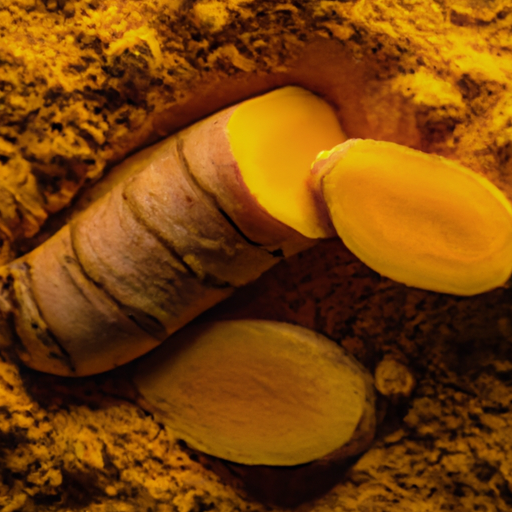Turmeric, the golden spice that has delighted our taste buds and mesmerized our senses for generations, carries a significance that goes beyond its vivid color and unique taste. This ancient herb, hailing from the Indian subcontinent, has been highly valued for its many health advantages. Nevertheless, it is crucial to acknowledge that not everyone is able to experience its miraculous properties. In this article, we will delve into who should avoid taking turmeric and the reasons why.
From individuals with gallbladder problems to pregnant or breastfeeding women, certain conditions and circumstances require caution when it comes to turmeric consumption. Additionally, those with bleeding disorders or scheduled for surgery, individuals with kidney stones, and people with iron deficiency or allergies to turmeric should also exercise restraint.
By understanding these limitations, we can navigate the world of turmeric with wisdom and make informed decisions about our health. So, join me as we delve into the realm of who should not take turmeric and unlock the secrets behind this golden treasure.
Key Takeaways
- Individuals with gallbladder problems should avoid turmeric as it stimulates bile production and can strain the digestive system.
- Individuals with bleeding disorders or taking blood-thinning medications should use caution with turmeric consumption as it can affect blood clotting and increase the risk of bleeding.
- Pregnant or breastfeeding women should be cautious with turmeric consumption as high doses may stimulate the uterus and affect breast milk production.
- Individuals with kidney stones should consult with their healthcare provider before consuming turmeric as it contains oxalate, which can contribute to the formation of kidney stones.
Individuals with gallbladder problems
Individuals who have gallbladder problems shouldn’t consume turmeric because it stimulates bile production, worsening symptoms. This is especially risky for those who have had gallbladder surgery, as increased bile production can strain the digestive system. It’s important for these individuals to be aware of the potential risks and consult with their healthcare provider before adding turmeric to their diet.
Fortunately, there are alternative remedies available for managing gallbladder problems. These include dietary changes, herbal supplements, and lifestyle modifications. These options can help alleviate symptoms without the potential complications associated with turmeric consumption.
Moving on to people with bleeding disorders or taking blood-thinning medications, it’s crucial to consider their specific circumstances before using turmeric.
People with bleeding disorders or taking blood-thinning medications
People with bleeding disorders or those on blood-thinning medications should be cautious when incorporating turmeric into their diet due to its potential effects on blood clotting. Turmeric contains a compound called curcumin, which has been shown to have anticoagulant properties. This means that it can increase the risk of bleeding in individuals with bleeding disorders or those taking blood-thinning medications. Potential interactions with anticoagulant drugs can result in excessive bleeding and may require dosage adjustment. It is important for individuals in this category to consult with their healthcare provider before using turmeric as a dietary supplement. Recommendations for dosage adjustment may be necessary to ensure the safe and effective use of turmeric. In the next section, we will discuss precautions for individuals who are scheduled for surgery.
Those who are scheduled for surgery
If you’re scheduled for surgery, it’s important to be aware of the potential risks associated with incorporating turmeric into your diet. Turmeric is a spice that contains a compound called curcumin, which has been found to have blood-thinning properties. This can prolong bleeding time and increase the risk of bleeding during and after surgery.
Additionally, turmeric may interfere with certain medications used during surgery, leading to surgical complications. It is recommended to stop consuming turmeric at least two weeks before the scheduled surgery to minimize these risks. Discuss with your healthcare provider about the use of turmeric and follow their guidance to ensure a smooth surgical experience and a speedy recovery.
Moving on to the next topic of pregnant or breastfeeding women, it’s important to consider the potential effects of turmeric on them.
Pregnant or breastfeeding women
During pregnancy or while breastfeeding, it’s important to be mindful of the potential effects turmeric may have on you and your baby. While turmeric is generally considered safe for consumption in small amounts, there are some potential risks to be aware of. Limited research suggests that high doses of turmeric may stimulate the uterus and increase the risk of premature labor or miscarriage. Additionally, turmeric may affect breast milk production and composition, potentially altering the taste and color of the milk. However, more research is needed to fully understand the effects of turmeric on breastfeeding. Next, we will explore the topic of individuals with kidney stones and their relationship with turmeric consumption.
Individuals with kidney stones
To protect your kidney health, be cautious with turmeric consumption if you have kidney stones. While turmeric is generally considered safe for most people, individuals with kidney stones may want to exercise caution due to potential risks.
Kidney stones are hard deposits that form in the kidneys and can cause significant discomfort and complications. Turmeric contains a compound called oxalate, which has been known to contribute to the formation of kidney stones in some cases. Therefore, it’s advisable for individuals with kidney stones to consult with their healthcare provider before incorporating turmeric into their diet or taking it as a supplement. By taking this precaution, you can ensure that you’re not putting unnecessary strain on your kidneys.
Moving on to the next section about people with iron deficiency or on iron supplements, it’s important to be aware of the potential interactions between turmeric and iron.
People with iron deficiency or on iron supplements
Individuals with iron deficiency or on iron supplements can still enjoy the benefits of turmeric while taking necessary precautions. Turmeric has been traditionally used to aid digestion and promote a healthy cardiovascular system. It contains curcumin, a compound known for its anti-inflammatory properties. However, it’s important to note that turmeric can interfere with iron absorption in the body. If you have iron deficiency or are taking iron supplements, it’s recommended to consume turmeric in moderation and consult with a healthcare professional. To better understand the impact of turmeric on iron absorption, consider the following table:
| Turmeric Consumption | Iron Absorption |
|---|---|
| In moderation | Potentially affected |
| Excessive | More likely to be affected |
Moving on to those with allergies or sensitivities to turmeric or its components, it’s crucial to take necessary precautions to avoid any adverse reactions.
Those with allergies or sensitivities to turmeric or its components
For those who find themselves in the unfortunate company of turmeric allergies or sensitivities, navigating the culinary world can be a bit like tiptoeing through a spice minefield. Turmeric, a popular spice known for its vibrant yellow color and earthy flavor, contains a compound called curcumin, which is responsible for its medicinal properties. However, some individuals may experience allergic reactions or sensitivities to curcumin or other components of turmeric.
If you fall into this category, fear not, as there are alternatives to turmeric that can still provide similar health benefits. Ginger, cumin, and paprika are just a few examples of spices that can be used as substitutes. Additionally, if you’re still interested in incorporating turmeric into your diet, it’s important to follow dosage guidelines recommended by healthcare professionals to minimize any potential adverse reactions.
Remember, your health always comes first.
Frequently Asked Questions
Can individuals with liver problems safely take turmeric?
Individuals with liver problems should exercise caution when taking turmeric. While it is generally safe, some studies suggest potential side effects on the liver. It’s advisable to consult with a healthcare professional before starting any new supplement.
Is it safe to consume turmeric if you have a history of ulcers or stomach issues?
Turmeric can worsen acid reflux and gastritis symptoms in individuals with a history of ulcers or stomach issues. It’s important to consult with a healthcare professional before consuming turmeric in such cases.
Should people with diabetes avoid turmeric consumption?
People with diabetes may want to exercise caution when consuming turmeric due to its potential effects on insulin resistance and blood sugar levels. It is advisable to consult with a healthcare professional before incorporating turmeric into their diet.
Can turmeric interact with certain medications besides blood-thinning drugs?
Interactions with antidepressant medications and the effects of turmeric on chemotherapy drugs can occur. It’s important to be cautious and consult with a healthcare professional before consuming turmeric if taking these medications.
Is it safe for children to consume turmeric?
Turmeric can be beneficial for children as it has anti-inflammatory properties and supports overall health. However, the dosage for kids should be appropriate and it is always best to consult a healthcare professional.
Conclusion
Based on the information provided, it’s clear that not everyone can safely consume turmeric. Individuals with gallbladder problems, bleeding disorders, or those taking blood-thinning medications should avoid it. Similarly, individuals scheduled for surgery, pregnant or breastfeeding women, those with kidney stones, iron deficiency, or allergies to turmeric should also refrain from its consumption.
Just as not all roads lead to the same destination, not all individuals can benefit from turmeric. It’s important to consult with a healthcare professional before incorporating it into your diet.










